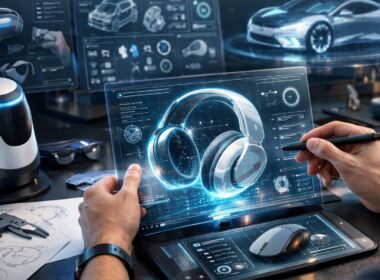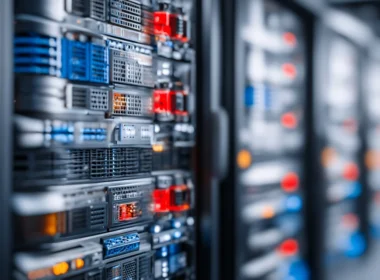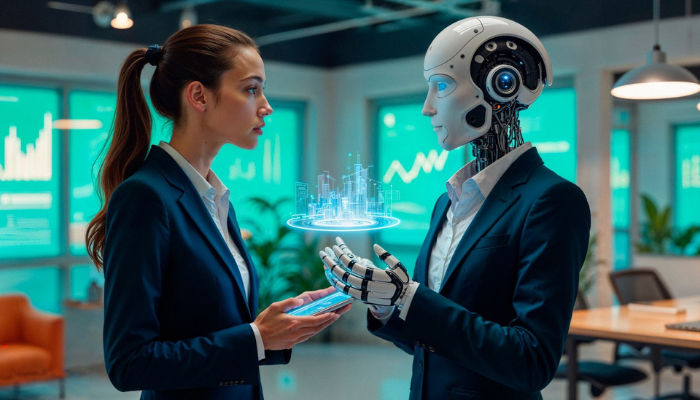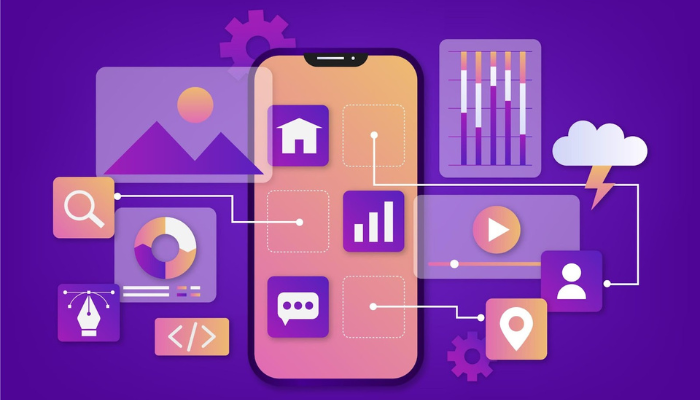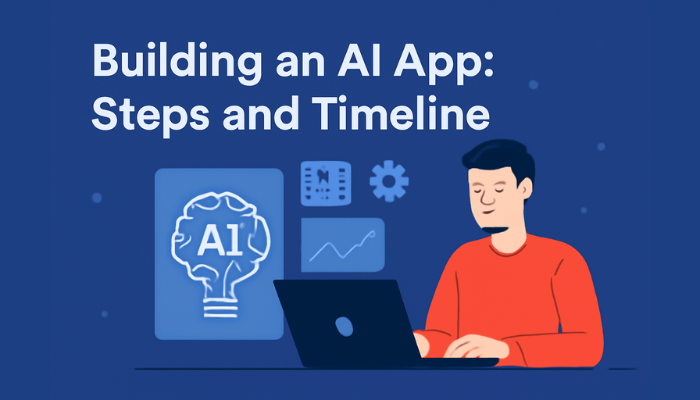For businesses today, keeping up with market demands, customer expectations, and operational efficiency is more challenging than ever. One of the key factors helping companies meet these demands is AI. However, despite the potential, many business leaders struggle with implementing AI in ways that generate tangible value.
AI is not just a business trend; it’s transforming how we live and work, from smarter healthcare systems to everyday experiences with voice assistants. Across industries like healthcare, retail, and finance, AI is already making an impact, helping businesses automate processes, make data-driven decisions, and offer personalized experiences at scale. In fact, only 50% of U.S. businesses have adopted AI, and many are still grappling with scaling their applications to improve operations or boost customer engagement.
In this blog, we explore how AI is shaping society, improving business operations, and enabling smarter decision-making. We’ll also highlight how Codewave’s AI solutions can help businesses fully utilize the power of AI to improve performance and stay ahead of the competition.
How AI is Transforming Society
AI is influencing nearly every aspect of society, and its potential is only beginning to unfold. From improving the way we interact with technology to reshaping industries, AI’s influence is widespread.
1. The Role of Smart Assistants and Personalization
AI is becoming a staple in daily life, especially with smart devices and virtual assistants. For instance, devices like Amazon’s Alexa and Apple’s Siri help with everyday tasks, from setting reminders to controlling home automation.
Similarly, AI powers personalized recommendation systems on platforms like Netflix and Amazon, enhancing user experiences by suggesting content based on user preferences. These systems use machine learning algorithms to predict what users might enjoy, increasing engagement.
2. Improving Diagnostics and Patient Care
AI’s impact on healthcare is profound, with its ability to revolutionize diagnostic accuracy and treatment optimization. AI-powered tools are now used for early detection of diseases such as cancer, often with greater precision than traditional methods. For example, machine learning algorithms assist in analyzing medical images to identify anomalies that can support doctors in diagnosing conditions more accurately and quickly.
Additionally, AI is being used in robotic surgeries, providing more accurate and minimally invasive procedures. Through advanced data analytics, AI is helping healthcare providers optimize patient care plans and improve outcomes.
3. AI Transforming Education
AI is also transforming the education sector by offering personalized learning experiences. Adaptive learning platforms can adjust content and pace based on the student’s performance, making education more effective and individualized.
Automated grading systems powered by AI allow teachers to save time on administrative tasks and focus more on personalized student interaction. By analyzing students’ learning patterns, AI can help identify areas where they struggle and suggest targeted learning materials.
4. AI Transforming Public Services
Public services, from traffic management to law enforcement, are benefiting from AI integration. AI is being used to optimize traffic flow, reducing congestion and improving urban mobility. In law enforcement, AI-driven predictive policing tools analyze data to identify crime hotspots and potential risks, aiding in proactive measures.
Moreover, AI is increasingly used in public health monitoring, detecting potential outbreaks and managing responses more effectively.
As AI transforms society, its influence extends even further into the business world, driving innovation and shaping new business strategies.
How AI is Transforming Business
In business, AI is enabling organizations to innovate, optimize operations, and offer more personalized services to customers.
1. AI Transforming Operations
AI is transforming business operations by automating repetitive tasks. Whether it’s handling customer service inquiries through chatbots, automating payroll and HR tasks, or managing inventory, AI reduces the need for manual intervention, saving time and lowering operational costs.
For example, businesses are using AI-powered automation tools to manage data entry, freeing up employees for higher-value work. This results in businesses operating more efficiently, with fewer errors and reduced costs. AI-driven automation can also help manage backend systems such as data processing, order fulfillment, and supply chain management, making business workflows smoother and more reliable.
2. AI Transforming Customer Experience
Businesses are increasingly turning to AI to enhance customer experiences. AI-powered chatbots are available 24/7, providing immediate responses to customer inquiries and offering solutions in real-time. Predictive analytics, another AI tool, helps businesses understand customer preferences and behaviors, improving the personalization of services and products.
For instance, e-commerce companies like Amazon use AI to offer personalized product recommendations, which enhances the shopping experience and increases conversion rates and customer loyalty. In retail, AI can also be used to predict demand, helping businesses optimize inventory management and minimize stockouts or overstocking issues.
3. How AI is Transforming Decision Making
AI’s ability to process and analyze vast amounts of data enables businesses to make better, faster decisions. Tools like business intelligence platforms use AI to analyze trends, forecast market conditions, and identify growth opportunities.
By using AI to uncover insights from large datasets, businesses can optimize operations, refine marketing strategies, and improve overall performance. AI also helps with risk management, providing predictive models that businesses can use to anticipate potential challenges. Financial companies, for example, use AI to detect fraudulent transactions by recognizing unusual patterns and behavior.
4. AI Transforming Sales Strategies
AI’s role in marketing is becoming increasingly prominent, with AI-driven analytics offering insights into customer behavior. Through predictive analytics, businesses can segment customers more effectively, enabling more targeted advertising and sales efforts.
For instance, AI-powered dynamic pricing models allow businesses to adjust prices based on real-time demand, maximizing revenue. Retailers can set prices that are competitive, while also factoring in consumer buying patterns. AI in sales helps improve the customer experience by providing personalized recommendations, increasing conversion rates, and boosting ROI.
5. How AI is Transforming Retail Business
In the retail industry, AI is transforming customer experiences and operational efficiency. AI tools are used for personalized shopping experiences, recommendation engines, and optimizing supply chain management.
Machine learning algorithms can predict trends, helping businesses stay ahead of the curve. Retailers are also using AI-powered visual recognition tools to offer virtual try-ons for products like clothes and accessories, improving the shopping experience and increasing sales conversion rates.
6. AI Transforming Financial Services
AI in finance is redefining everything from fraud detection to investment strategies. Banks and financial institutions use AI to identify fraudulent activities by detecting irregularities in transaction data, providing an extra layer of security for customers. Additionally, AI-driven algorithms help in algorithmic trading, processing vast amounts of data to make real-time decisions for stock trading.
AI-powered chatbots in finance offer personalized financial advice, guide customers through complex processes like loan applications, and provide quick responses to frequently asked questions, improving customer service and reducing operational costs.
7. AI Transforming Energy Usage
The energy industry is benefiting greatly from AI as it helps manage energy consumption more effectively, optimize energy grids, and predict equipment maintenance. AI algorithms can predict energy demand based on real-time data, allowing energy companies to better allocate resources and reduce waste. Smart grids, powered by AI, can identify energy inefficiencies, automatically adjusting to optimize energy flow and consumption.
In addition, AI is being used for predictive maintenance in the energy sector, particularly for wind turbines, solar panels, and power plants, improving system uptime and reducing repair costs.
8. How AI is Transforming Logistics
AI is changing the transportation and logistics industry by optimizing routes, predicting vehicle maintenance, and improving supply chain management. Autonomous vehicles powered by AI are becoming more prominent, and logistics companies use AI for route optimization, reducing fuel costs and delivery times. AI also helps in fleet management, ensuring vehicles are utilized effectively, and minimizing downtime.
AI tools are also used to predict shipment delays and optimize inventory management, ensuring that businesses in the transportation and logistics space can deliver on customer expectations.
As AI continues to drive change in both society and business, it is important to understand what the future holds and how these transformations will unfold in the coming years.
Challenges of AI for Society and Business
The rapid rise of AI brings about significant challenges that need to be addressed for its responsible adoption in society and business.
1. Ethical Concerns and Bias in AI
AI algorithms are trained on data, and if the data used is biased, the outcome can also be biased. This raises concerns about fairness, particularly in sectors like finance and criminal justice. Unfair AI decisions can perpetuate inequality and even lead to discrimination, which has far-reaching consequences for businesses and society.
2. Job Displacement and Economic Inequality
Automation through AI has the potential to replace jobs, particularly in industries that rely on repetitive tasks. This raises the issue of job displacement, which could lead to economic inequality if there aren’t systems in place to reskill workers or provide social safety nets for displaced individuals. The future of work will need to address this gap to avoid exacerbating societal divisions.
3. Data Privacy and Security Risks
As AI systems process vast amounts of personal data, the risk of data breaches and misuse of sensitive information increases. Businesses need to prioritize data protection to avoid breaches that could harm customer trust and expose them to regulatory fines. In industries such as healthcare and finance, the stakes are particularly high due to the sensitivity of the data involved.
4. AI’s Impact on Decision-Making
AI is increasingly being used for decision-making, but this brings the challenge of accountability. In some cases, decisions made by AI systems may not be fully explainable, making it difficult for businesses and society to determine who is responsible if something goes wrong. This raises concerns in fields like law enforcement, healthcare, and finance, where decision transparency is essential.
5. Lack of Regulation and Standards
The rapid advancement of AI has outpaced the development of legal and ethical standards to govern its use. Without proper regulation, there’s a risk of AI technologies being misused, leading to social and economic harm. Businesses must ensure they operate within ethical guidelines and be part of the larger conversation on AI policy.
With the challenges of AI in mind, it’s essential to look ahead and explore the future trends that will shape its development.
Future Trends of AI
AI’s future is full of exciting developments that will unlock new possibilities for industries and businesses alike.
1. AI in Autonomous Vehicles
One of the most exciting developments is the role of AI in autonomous vehicles. Self-driving cars are expected to drastically reduce traffic accidents and congestion, making roads safer and more efficient. The rise of autonomous transport will create new business opportunities while challenging existing industries like insurance and logistics.
2. AI and Quantum Computing
AI’s integration with quantum computing will allow for even faster problem-solving capabilities. Quantum computing could lead to breakthroughs in industries such as drug discovery, material science, and cryptography, allowing businesses to solve complex problems much quicker than today’s traditional computers.
3. AI in Sustainability and Climate Change
AI is becoming a key tool in the fight against climate change. Through predictive analytics and energy optimization algorithms, AI helps industries reduce carbon footprints by maximizing energy efficiency. AI is also being used to predict environmental changes, enabling businesses and governments to act proactively in mitigating climate risks.
4. Personalization and Customer-Centric AI
AI’s future in business is increasingly tied to customer personalization. As AI systems become more sophisticated, businesses will be able to offer hyper-personalized experiences that cater to individual preferences in real-time. This will extend beyond marketing to product development, where AI could drive innovations tailored to consumer needs.
5. AI Integration with Emerging Technologies
The future of AI is closely tied to other emerging technologies like blockchain, IoT, and 6G. Together, these technologies will further improve supply chain management, real-time data analysis, and automation. AI will be at the core of these innovations, making businesses more agile and customer-centric.
Codewave’s Role in AI Transformation
Codewave has been at the forefront of helping businesses integrate AI into their strategies. Our AI-driven solutions enable businesses to access the potential of artificial intelligence. Our services in Digital Transformation and AI/ML Development help businesses build smarter operations and deliver more personalized customer experiences.
We specialize in developing AI-powered applications like customer service portals, AI-driven web and mobile apps, and AI agents that enhance customer experiences, drive smarter decision-making, and automate repetitive tasks. Our solutions are tailored to help businesses optimize workflows, improve decision-making speed, and boost overall performance.
Reach out to us now to discover how our AI-powered services can take your business to the next level. Time to make smarter decisions and stay ahead of the curve!
Codewave is a UX first design thinking & digital transformation services company, designing & engineering innovative mobile apps, cloud, & edge solutions.
